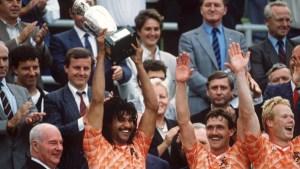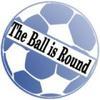Back in the late 1980’s Europe’s political landscape was changing. The Eastern Bloc was crumbling. Football was one language whereby different political ideals could be set aside for 90 minutes. That was unless you lived in the divided Germany at the time. It is hard to imagine today when we look at Germany that it was still a country partitioned by a wall into the haves and the have-nots. No place on earth saw this divide more than Berlin where the wall completely cut off a section of the city, known as West Berlin, which was a West German isle surrounded by a sea of the Eastern Bloc, a capitalist island in a sea of communism. Football was being suffocated by the political situation.
Whilst the ageing, yet still impressive Olympiastadion, was still one of the biggest stadiums in the country, and its tenants Hertha Berlin were still able to cross the wall to compete in the Bundesliga, it was deemed a journey too far for the West German national side. The team featuring the likes of Harald Schumacher, Andreas Brehme, Lothar Matthäus and captain Karl-Heinz Rummenigge had finished runners-up to Argentina in the 1986 World Cup Final in Mexico and would go onto win the trophy four years later. This was a golden generation of West Germans, yet the West Berliners were denied the opportunity to see their national team play in the city for nearly four years from 1983 as the political situation took priority over the beautiful game.
During this period, West Germany had won the right to host the 1988 European Championships ahead of a joint Scandinavian bid from Norway, Sweden and Denmark and an expression of interest from England. However, political arguments kicked in from day one about the initial West German mutterings of hosting some of the games during the tournament in the Olympiastadion. The Eastern Bloc disagreed with the fact that West Berlin were part of the Federal Republic of Germany (despite Hertha Berlin’s participation in the Bundesliga and Oberliga) and concerns were expressed that should games be held there, the Eastern Bloc may withdraw their membership from UEFA. Despite three games being played at the Olympiastadion in the 1974 FIFA World Cup, including East Germany versus Chile, it was now a footballing hot potato that the West German football federation, the DFB, did not want to handle.
After significant political debate on both sides of the Berlin Wall, West Germany relented and agreed that the host venues would be Munich, Hamburg, Frankfurt, Gelsenkirchen, Stuttgart, Cologne, Hanover and Düsseldorf. West Berlin would have to look over the wall with envious eyes.
However, DFB committee member Hermann Neuberger came up with a compromise that would placate most parties. The Berlin Four Nation Tournament was announced in late 1987 to take place prior to the European Championships, in West Berlin. Invites were sent to World Champions Argentina, European Championship favourites Soviet Union (and thus getting the Eastern Bloc onside), Sweden and West Germany. Whilst there had been calls for the participation of East Germany, many observers suggested that the Eastern Bloc didn’t want an embarrassing and politically sensitive situation of the two German sides meeting and playing with a political football.
The tournament was arranged over Easter weekend in the simplest format. Two semi-finals were played back to back in the Olympiastadion on 31 March 1988, with West Germany drawn against Sweden and the Soviets against Argentina. With a disappointing 23,700 fans in the stadium for the start of the tournament, West Germany took the lead when Olympique de Marsaille’s Klaus Allofs netted just before half time against the Swedes. Their lead was cancelled out in the 75th minute when Peter Truedsson equalised. As the stadium at the time had poor floodlight facilities at the time, there was little time scheduled between the two games and so extra time was scrapped and the tie went direct to penalties which saw the Swedes run out 4-2 winners after Lothar Matthäus and Rudi Völler missed their spot kicks.
Just thirty minutes after the end of the first semi-final, Argentina and Soviet Union kicked off the second semi-final. Despite having Diego Maradona in their starting eleven, Russia underlined their promise as potential European Champions by racing to a three-nil lead after just fifteen minutes thanks to goals from Zavarov, Prostasov and Lytovchenko. Prostasov added a fourth late in the game after Diego had scored from a freekick. The Soviet Union’s 4-2 victory meant that the final everyone wanted to see, a repeat of the 1986 World Cup Final, would be a mere warm up to the final two days later. Ironically, the official attendance for the second game is recorded as 1,300 more than the West German game earlier in the afternoon.
Once again the soccer-starved public of West Berlin hardly flocked to the Olympiastadion. Just over 25,000 saw the 3rd/4th play off game between West Germany and Argentina two days later which was decided by a single Matthäus goal, and unofficially considerably more than that stayed in their seats for the final between Sweden and the Soviets. Two second half goals from Hans Eskilsson and Hans Holmquist saw the tournament won by the Swedes with a huge sigh of relief from the organisers that the weekend had passed off without any political incidents, although disappointed at the lack of attendance for both games.

The concept of the Berlin tournament was never repeated, perhaps because of the fall of the Berlin Wall eighteen months later and the subsequent fall of the Eastern Bloc in the proceeding few years, although it could be said that various attempts to resurrect a similar competition were behind such tournaments as the Umbro Cup held in England in 1995 featuring England, Japan, Sweden and Brazil or the Tournoi de France featuring Brazil, Italy, England and the host nation in June 1997. But for one bright moment in Spring 1988 it seemed that football might break the political divide between the East and West in Europe. Alas, it was not to be.

